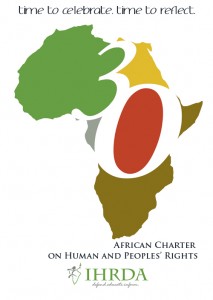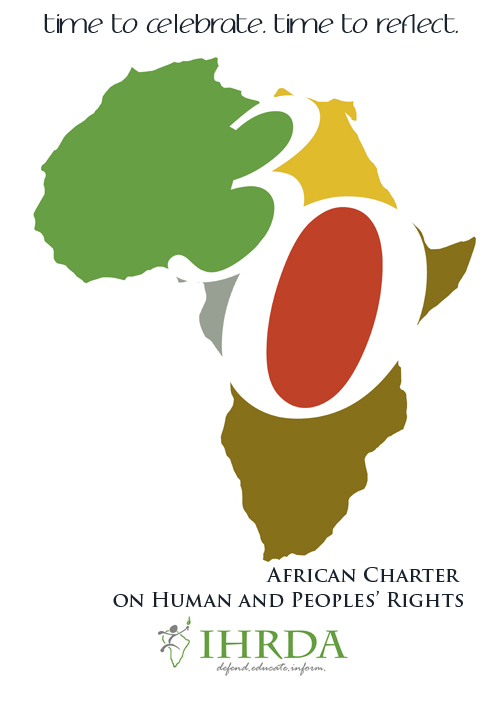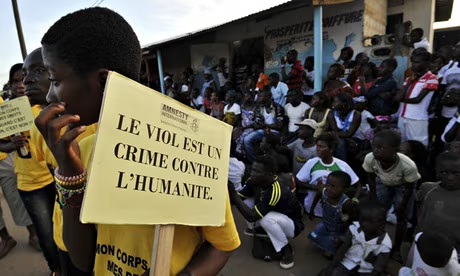 On June 27 1981, OAU Heads of State and Government, meeting in Nairobi, adopted the African Charter on Human and Peoples’ Rights (ACHPR), thus beginning the 30 year journey of building the African Human Rights System. Keen to have an African contribution to international human rights law, the African Charter reaffirmed the indivisibility and interdependence of all human rights, asserted for the first time peoples’ rights, and created duties as essential corresponding elements to human rights.
On June 27 1981, OAU Heads of State and Government, meeting in Nairobi, adopted the African Charter on Human and Peoples’ Rights (ACHPR), thus beginning the 30 year journey of building the African Human Rights System. Keen to have an African contribution to international human rights law, the African Charter reaffirmed the indivisibility and interdependence of all human rights, asserted for the first time peoples’ rights, and created duties as essential corresponding elements to human rights.
Over the last 30 years, the African Charter has grown structurally and in substance. Its primary enforcement body, the African Commission on Human and Peoples’ Rights, established on November 2 1987, has laid down the foundations of continental human rights standards. It has asserted Africa’s position on such matters as the non-derogability of ACHPR rights and their exceptional limitation, on state responsibility for human rights enjoyment in their territories, as well as recognising the right to housing and food as implicitly protected by the African Charter, among others. The establishment of the African Court on Human and Peoples’ Rights, whose first Bench was sworn in on 2 July 2006, has added to the African Charter’s enforcement, with the Court’s express ability to issue legally binding decisions. Its first judgements on the merits are expected later this year.
Despite these laudable strides, some grey areas of law remain both in the African Charter and in the jurisprudence of the African Commission. One such grey area is the protection of nationals against mass expulsion from their own countries. Although left out of the text, the experience of many African nationals over the last 30 years, points to the need to formally protect those prone to such violations. Although it determined an emblematic case of mass expulsion of nationals, the African Commission did not develop the right of nationals not to be expelled or expound its understanding of “expulsion”.
Similarly, the African Charter does not guarantee the right to a nationality. This lacuna is of particular concern given its centrality to the enjoyment of human rights. Indeed, the right to nationality has been called “the right to have rights” and is closely linked to the problem of mass expulsion of nationals as denationalisation invariably precedes it. Since the 1970s, Africa has experienced numerous nationality rights violations, from individuals being denied a nationality to mass denationalisations that have fueled civil strife, and civil and inter-state wars in several parts of Africa.[1] In cases concerning citizenship, the African Commission extensively discussed non-discrimination while the right to nationality, which was the main issue, was given insufficient attention.
The justiciability, content and empirical realisation of socio-economic rights are questions that judicial bodies continue to grapple with across Africa. African human rights institutions would do well to contribute to this progress. These and many other grey areas remain to be illuminated by the African Commission and African Court.
Beyond the normative, there also exists the need for effective implementation of decisions and a monitoring system thereof. Despite the creation of the African Court and the African Committee of Experts on the Rights and Welfare of the Child, the African Commission remains the most dynamic African human rights body and the first port of call for those unable to find justice in their countries. The effective implementation of its decisions and their proper monitoring is critical if the African Charter is to achieve its purpose.
Celebrating this 30 year anniversary of the African Charter should also be a time for frank reflection. Despite the commendable developments, enforcement of Charter guarantees is unacceptably low, and the limited awareness of the African Charter itself remains worrying with many unaware of its existence, even those in the legal and judicial fraternity. These matters require renewed, urgent and innovative attention from the African human rights institutions themselves as well as state parties to the African Charter and civil society.
IHRDA has participated, since 1998, in some of the developments noted above in the African human rights system through litigation, training and information dissemination. We look forward to contributing further to the development of human rights standards as well as ensuring as wide as possible a sensitisation of the possibilities for justice and reparation that the African Charter and its treaty bodies offer.
IHRDA is honoured to have served the African Human Rights System in its formative years and remains committed to working with the treaty bodies of the African Charter in the timely and effective discharge of their respective mandates.
[1] See Bronwen Manby, Struggles for Citizenship in Africa, Zed Books, London/ New York 2009, p. 18







